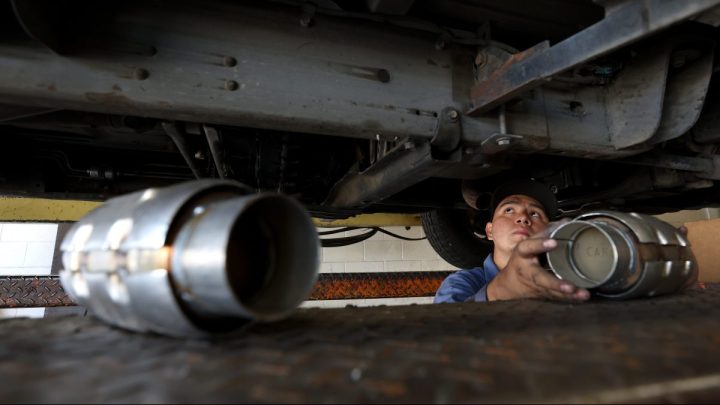
Thefts of catalytic converters keep surging. That’s costing drivers and insurers.
Thefts of catalytic converters keep surging. That’s costing drivers and insurers.

Nine cars showed up at Dan Luna’s Los Angeles-based muffler shop during one week in April, all with the unmistakable loud rumbling noise that meant each vehicle’s catalytic converter was missing. The part — which reduces pollutants — had been stolen.
“It’s getting crazy. We’re superbusy,” Luna said.
Thefts of catalytic converters continue to cause headaches and create expense for drivers. The trace metals inside the device, like platinum and rhodium, are valuable, and the number of catalytic converter thefts just keeps rising. Thefts increased 4,830% nationally between 2018 and 2022, according to claims data from the National Insurance Crime Bureau. California is the state with the most claims, followed by Texas, Pennsylvania, Illinois and Washington.
Hybrid vehicles are a top target for thieves because their converters contain more precious metals. But all cars have the part, so everything from family sedans to pickup trucks show up at Luna’s shop.
A combination of supply chain troubles and the sheer number of thefts means Luna has to tell customers that replacement catalytic converters are back-ordered for up to six months. “A customer’s nightmare,” he said.
Some states are trying to address the surge of thefts with new laws that restrict who can recycle catalytic converters. Some are also increasing fines and jail time for thieves. Even Congress is considering requiring automakers to etch a VIN code onto converters to make it easier to trace stolen parts. That idea stalled in committee last fall.
Meanwhile, drivers like Carrie Lederer feel that they have few options to protect their vehicles. “We’re between a rock and a hard place,” Lederer said.
The L.A.-area resident parks her car on the street in front of her apartment. In 2020, Lederer had a catalytic converter stolen for the first time, and her insurance didn’t cover a new part for her 2008 Prius. It cost her $3,000 for a replacement and $500 for a metal shield that was supposed to slow thieves down.
But this year, her catalytic converter was stolen two more times. Each time, she had to pay a $500 insurance deductible. Most recently, Lederer was without her car for around three months while she waited for the part. In the meantime, she used her bike to get around town. When her car was finally ready to bring home, she said it didn’t feel like a moment for celebrating.
“Maybe I just don’t even need a vehicle,” Lederer said. “Because I sure as heck don’t want to spend $500 every two weeks.”
Insurance companies are also spending a lot on replacing stolen catalytic converters. In 2021, State Farm Insurance paid out more than $73 million in converter theft claims nationally. In 2022, it jumped to $112 million.
“The numbers are astounding,” said Amy Harris, a State Farm spokesperson. “It’s something that we were hoping we would start to see trend downwards.”
More than a quarter of State Farm’s insurance claims come from California. Each of these thousands of claims represents somebody suddenly having to get by without a car, Harris said. Not everyone can make the adjustment, she said, when they need a car to get to work or handle family matters.
“It’s a huge inconvenience for everybody,” she said.
The No. 1 piece of advice to prevent theft is to park in a secure garage, which is not an option for most people living in large cities like Los Angeles. Cars parked on the street may become a target for quick cash because illegitimate recyclers will pay thieves upward of $950 for certain catalytic converters, said Capt. Martin Rodriguez of the L.A. County Sheriff’s Department.
“As long as there’s a market for these materials,” Rodriguez said, “then there’s going to be theft of these items.”
There’s a lot happening in the world. Through it all, Marketplace is here for you.
You rely on Marketplace to break down the world’s events and tell you how it affects you in a fact-based, approachable way. We rely on your financial support to keep making that possible.
Your donation today powers the independent journalism that you rely on. For just $5/month, you can help sustain Marketplace so we can keep reporting on the things that matter to you.











